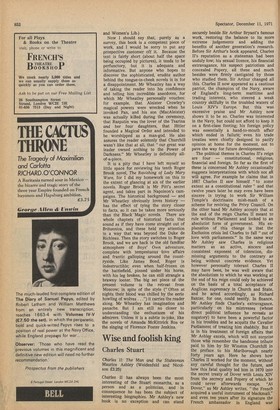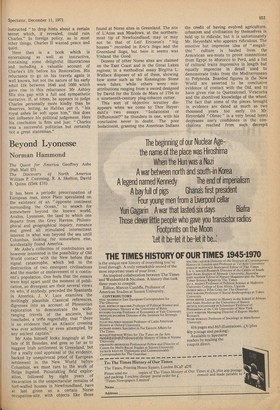Wise and foolish king
Charles Stuart
Charles II: The Man and the Statesman Maurice Ashley (Weidenfeld and Nicolson 0.25) Charles II has always been the most interesting of the Stuart monarchs, as a person and as a politician, and in consequence he has been the subject of interesting biographies. Mr Ashley's new book is no exception and can stand securely beside Sir Arthur Bryant's famous work, restoring the balance to its more extreme judgements and adding the benefits of another generation's research. Before Sir Arthur's book appeared, Charles II's reputation as a statesman had been unduly low; his sexual licence, his financial extravagance, his suspect patriotism and concealed Popery, all these and much besides were firmly castigated by those who studied them. Sir Arthur changed all this. Charles II now appeared as a cautious patriot, the champion of the Navy, aware of England's long-term maritime and trading interests, who steered a weak country skilfully in the troubled waters of Louis XIV's Europe. But this was excessive praise and Mr Ashley now shows it to be so. Charles was interested in the Navy, but could not afford to keep it on a first-class footing; his foreign policy was essentially a hand-to-mouth affair which ended in failure; even his trade treaties were chiefly designed to pacify opinion at home for the moment, not to pave the way for future developments.
The political themes in Charles H's reign are four — constitutional, religious, financial and foreign. So far as the first of these is concerned Mr Ashley occasionally suggests interpretations with which not all will agree. For example he claims that in 1667 Charles II saw himself "to some extent as a constitutional ruler" and that twelve years later he may even have been sincere in trying to work Sir William Temple's doctrinaire mish-mash of a scheme for reviving the Privy Council. On the other hand Mr Ashley accepts that at the end of the reign Charles II meant to rule without Parliament and looked to an absolutist form of government. His explanation of this change is that the Exclusion crisis led Charles to fall "out of love with parliaments." In the same way Mr Ashley saw Charles in religious matters as an active, sincere and consistent exponent of toleration, dismissing arguments to the contrary as being without concrete evidence. Yet however personally tolerant Charles II may have been, he was well aware that the absolutism to which he was working at the end of his reign could only be achieved on the basis of a total acceptance of Anglican supremacy in Church and State, and he acted accordingly, as Richard Baxter, for one, could testify. In finance, Mr Ashley finds Charles's extravagance, particularly on his mistresses (whose direct political influence he reveals as nugatory) to have been a powerful factor in his troubles and he acquits the Cavalier Parliament of treating him shabbily. But it is in his treatment of foreign affairs that Mr Ashley excels, which will not surprise those who remember the handsome tribute paid to him by Sir Winston Churchill in the preface to his Marlborough neatly forty years ago. Here he shows how Charles II worked for the moment, without any careful thought for the future, and how this fatal quality led him in 1670 into the secret treaty of Dover with Louis XIV from the secrecy and Popery of which he could never afterwards escape. "At Dover," as Mr Ashley writes, "the French acquired a useful instrument of blackmail," and even ten years after its signature the French ambassador in England was
instructed "to drop hints about a certain secret which, if revealed, could ruin Charles." In foreign policy, as in most other things, Charles II wanted peace and quiet.
Here then is a book which is entertaining as well as instructive, containing some delightful illustrations and including a valuable account of Charles's life before his Restoration. His reluctance to go on his travels again is well known, but not the nature of his early adult life between 1646 and 1660 which gave rise to this reluctance. Mr Ashley fills this gap with a full and sympathetic narrative. If, at times, he appears to judge Charles personally more kindly than he deserves, letting, as Halifax put it, "his royal ashes lie soft upon him," this does not influence his political judgement. Here his conclusion is firm and just: " Charles was a successful politician but certainly not a great statesman."











































 Previous page
Previous page